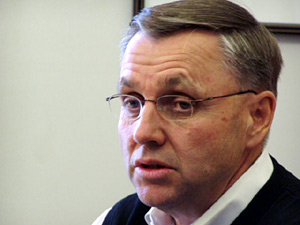April 26, 2005
 |
| A ballpark with no state financing drew immediate interest from top legislative leaders, including DFL Senate Majority Leader Dean Johnson. (MPR Photo/Michael Khoo) |
St. Paul, Minn. — For almost a decade, ballpark advocates have struggled to find the right mix of private investments, local tax dollars and state assistance to build a new home for the Minnesota Twins. Despite countless task force reports, bill introductions and financing schemes, each approach has foundered -- often because of an aversion to using state resources to subsidize a private business.
Twins Sports President Jerry Bell says the latest plan avoids that pitfall.
"It is so simple, so straightfoward. It doesn't involve any state money. Many of the aspects of this are exactly what the Legislature has been asking for and looking to us to come up with," according to Bell.
The deal would require that team owner Carl Pohlad contribute $125 million towards the project's $360 million price tag. The remainder, along with about $100 million in infrastructure improvements, would be financed by a Hennepin County tax increase of .15 percent. That's 3 cents on a $20 purchase.
A ballpark with no state financing drew immediate interest from top legislative leaders, including DFL Senate Majority Leader Dean Johnson.
"OK, if we're going to move Minnesota ahead and be a competitive place both for work as well as in recreation and create an environment and ambience that is attractive to our state, then there has to be some investment," Johnson said.
Johnson has long been a Twins stadium supporter. Like the team, he's argued that the Metrodome no longer provides the revenues necessary to field a competitive ball club. The enthusiasm is bipartisan.
Republican House Speaker Steve Sviggum says he, too, is encouraged by the latest deal. But many Hennepin County lawmakers object to a countywide tax to pay for a Minneapolis facility.
Erik Paulsen, R-Eden Prairie, the House's second-in-command, says he's not comfortable requiring his constituents to pay the ballpark bill.
"I have concerns about someone who goes out to eat for dinner in Eden Prairie or makes a purchase in Eden Prairie and is contributing to the stadium in downtown Minneapolis. And I have some concerns, quite frankly, about the bypass of a referendum. I think at a minimum it would be helpful to have voters in Hennepin County vote on the issue," Paulsen said.
Before Hennepin County can levy the proposed stadium tax, lawmakers and Gov. Tim Pawlenty will have to give permission. And a key part of the debate will turn on whether county voters are able to voice their preferences at a referendum, or whether the county board can impose the tax at its own discretion.
The team and the county say a county-wide vote will scuttle the deal. They argue that board members, as elected representatives, should have the authority to make tax decisions with a direct citizen vote. And Pawlenty, who has rejected any new state tax increases and has championed citizen referendums, says he won't rule anything out.
"I would definitely prefer a referendum. But I want to give the Twins and Hennepin County a fair chance to sell this at the Legislature, so we're not going to slam the door shut on a scenario where the Hennepin County Board decides whether there's a referendum or not," according to Pawlenty.
Lawmakers must also have an image problem to consider. With lawmakers considering reductions in state health care programs, DFLer Sen. John Marty of Roseville wonders why anyone would consider imposing a tax for professional baseball. And he rejects the argument that the tax is too minor for most consumers to notice.
"If it's hardly noticeable, why don't we use that to fund MinnesotaCare? But the point is is does raise real money, significant money, money that we could be using and should be using for meeting other needs," Marty said.
All parties agree that a ballpark debate will have to wait until legislators complete their work on a new, two-year state budget. But four weeks left in the regular session and with GOP and DFL leaders deeply divided over how to balance the state's books, a stadium plan -- even a popular one -- could fall victim to legislative gridlock.





